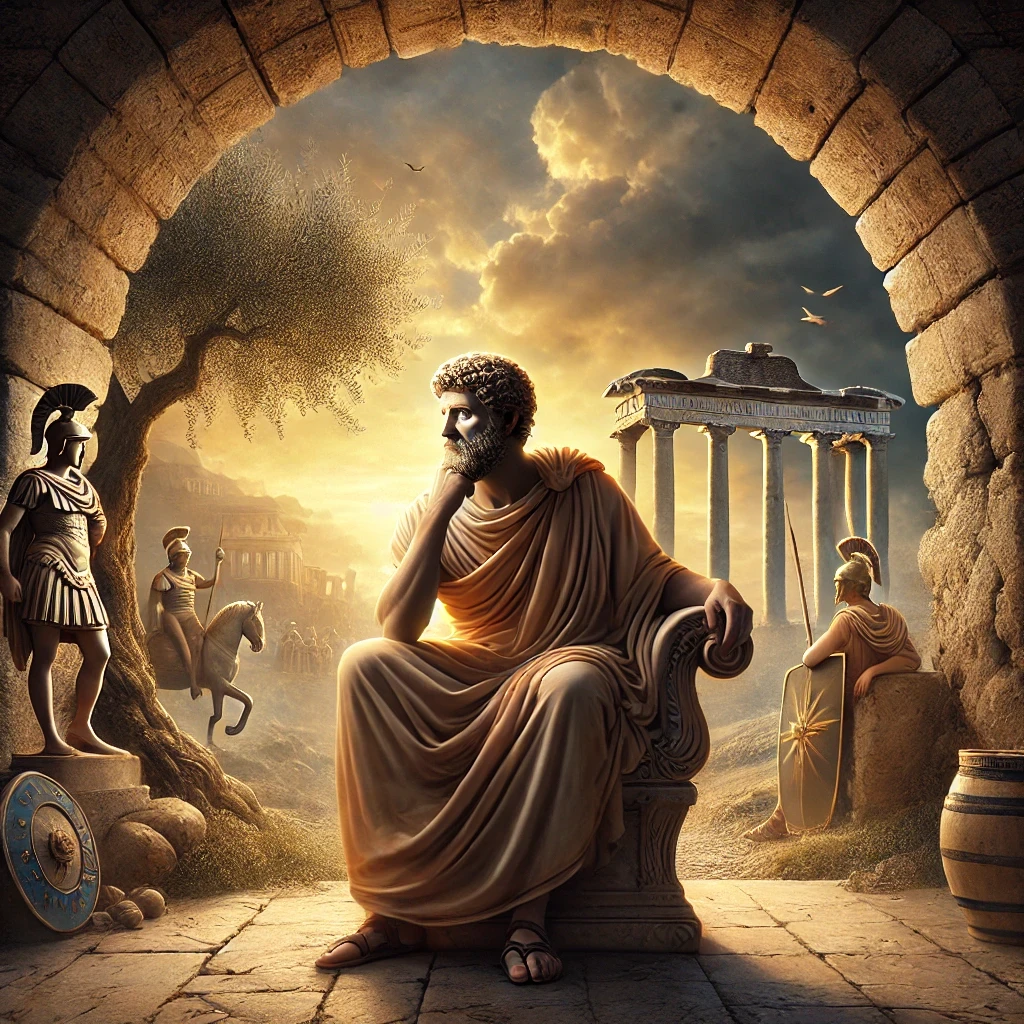Who Was Marcus Aurelius? The Philosopher King
Explore the life and legacy of Marcus Aurelius, the Roman emperor and Stoic philosopher known as the 'Philosopher King' who provided timeless wisdom in his writings.

Jon High
·
Dec 11, 2024
Most philosophers talk a big game. Marcus Aurelius actually walked the walk. While other ancient thinkers were writing about the ideal way to live, this guy was literally running the Roman Empire – dealing with plagues, wars, betrayal, and family drama that would make your latest relationship crisis look like a kindergarten squabble.
Think about that for a second: imagine being the most powerful person in the known world, able to have anyone killed with a snap of your fingers, and instead of going full power-mad tyrant, you spend your evenings writing reminders to yourself about staying humble and treating others with kindness. That's some next-level self-awareness.
Early Life
Born in 121 CE to an elite Roman family, Marcus Aurelius wasn't some random dude who got lucky. His path to becoming emperor started when Emperor Hadrian noticed young Marcus's potential and basically said, "That kid's going places." He arranged for Marcus to be adopted by the future emperor Antoninus Pius.
But here's where it gets interesting: instead of turning into a spoiled trust-fund brat, Marcus became obsessed with self-improvement. While other rich Roman kids were out partying, he was sleeping on the floor and studying philosophy. His main teacher, Rusticus, introduced him to Stoic philosophy by giving him a copy of Epictetus's lectures. It was like handing a teenager a self-help book, except this one actually changed his life.
Marcus the Emperor
When Marcus became emperor in 161 CE, he inherited an empire at its peak – which, if you know anything about peaks, means everything was about to go downhill. Fast.
First, a massive flood destroyed Rome's food supply. Then a plague killed millions. The empire's enemies saw their chance and attacked from all sides. Oh, and his co-emperor (and supposed friend) Lucius Verus might have been trying to undermine him the whole time.
Most leaders would have cracked under half that pressure. Marcus? He suited up and handled it all while still finding time to work on himself. He spent most of his reign on the frontiers, defending the empire from Germanic tribes. Picture writing philosophical insights by candlelight in your tent after a day of battlefield strategy meetings.
Marcus the Philosopher
As we explore in "How to Think Like a Roman Emperor", Marcus wasn't just dabbling in philosophy – he was living it. Stoicism wasn't a hobby for him; it was his operating system. He used it to:
Make better decisions under pressure
Deal with difficult people (including his own family)
Stay focused on what matters
Handle success without letting it go to his head
The Meditations
Here's the wild thing about Meditations: it was never meant for us to read. These were Marcus's private journals – basically his personal blog before blogs existed. He wrote them for himself, which is exactly what makes them so powerful.
This isn't some polished philosophical treatise trying to impress people. It's raw, honest self-talk from one of the most powerful humans ever, trying to stay grounded and do the right thing. As we cover in our summary of Meditations, the book is basically Marcus reminding himself of three core ideas:
Focus on what you can control
Accept what you can't control
Treat others with justice, regardless of how they treat you
Best Marcus Aurelius Quotes
On Leadership:
"Be tolerant with others and strict with yourself."
This wasn't just pretty words – he lived this every day as emperor.
On Adversity:
"The impediment to action advances action. What stands in the way becomes the way."
Think about that next time you're complaining about obstacles in your path.
On Life and Death:
"You could leave life right now. Let that determine what you do and say and think."
Nothing like a daily reminder of mortality to cut through the BS.
On Self-Improvement:
"Waste no more time arguing about what a good man should be. Be one."
The ancient equivalent of "shut up and do the work."
On Dealing with Others:
"The best revenge is to be unlike him who performed the injury."
For more life-changing quotes, check out our complete guide to Marcus Aurelius's best insights.
Legacy and Influence
Nearly 2,000 years after his death, Marcus is having a moment. CEOs, athletes, and leaders across the world are discovering that this ancient Roman's wisdom is exactly what we need in our chaotic modern world.
Why? Because the fundamental human challenges haven't changed. We still deal with:
Difficult people
Uncertain futures
The tension between doing what's right and what's easy
The struggle to stay focused in a world of distractions
What We Can Learn
The biggest lesson from Marcus isn't just what he wrote – it's how he lived. He shows us that:
Power doesn't have to corrupt
Philosophy isn't just academic theory
Real strength comes from self-reflection
You can be both powerful and kind
Start Here: Your Marcus Aurelius Reading Guide
Ready to dive into Marcus's wisdom yourself? Start with:
Gregory Hays's translation of Meditations (the most readable modern version)
"How to Think Like a Roman Emperor" by Donald Robertson
Key passages to begin with: Books 2, 3, and 5 of Meditations
Remember: Marcus wrote this stuff to himself, not expecting anyone else would read it. That means when you read Meditations, you're not just getting philosophy – you're getting unfiltered wisdom from someone who actually lived these principles under the most extreme circumstances imaginable.



